

Hans Bloemen
Key publications








List of publications
Bloemen, HansG. (2023). Language proficiency of migrants: the relation with job satisfaction and skill matching Empirical Economics, 65(6):2899--2952.
Bloemen, H. (2019). Collective Labour Supply, Taxes, and Intrahousehold Allocation: An Empirical Approach Journal of Business and Economic Statistics, 37(3):471--483.
Bloemen, H., Hochguertel, S. and Zweerink, J. (2019). The Effect of Incentive-Induced Retirement on Spousal Retirement Rates: Evidence From a Natural Experiment Economic Inquiry, 57(2):910--930.
Bloemen, H., Hochguertel, S. and Zweerink, J. (2018). Job loss, firm-level heterogeneity and mortality: Evidence from administrative data Journal of Health Economics, 59:78--90.
Bloemen, H., Hochguertel, S. and Zweerink, J. (2017). The causal effect of retirement on mortality: Evidence from targeted incentives to retire early Health Economics, 26(12):e204–e218.
Bloemen, H. (2016). Private wealth and job exit at older age: a random effects model Empirical Economics, 51(2):763--807.
Li, Y., Mastrogiacomo, M., Hochguertel, S. and Bloemen, H. (2016). The role of wealth in the start-up decision of new self-employed: Evidence from a pension policy reform Labour Economics, 41(August):280--290.
Bloemen, H. and Stancanelli, E. (2015). Toyboys or supergirls?An analysis of partners’ employment outcomes when she outearns him Review of Economics of the Household, 13(3):501--530.
Bloemen, H. and Stancanelli, E. (2014). Market hours, household work, child care, and wage rates of partners: an empirical analysis Review of Economics of the Household, 12(1):51--81.
Lammers, M., Bloemen, H. and Hochguertel, S. (2013). Job search requirements for older unemployed: Transitions to employment, early retirement and disability benefits European Economic Review, 58(C):31--57.
Bloemen, H. (2011). The effect of private wealth on the retirement rate: an empirical analysis Economica, 78(312):637--655.
Bloemen, H., Pasqua, S. and Stancanelli, E. (2010). An empirical analysis of the time allocation of Italian couples: Are they responsive? Review of Economics of the Household, 8(3):345--369.
Bloemen, H. (2010). An empirical model of collective household labour supply with non-participation Economic Journal, 120(543):183--214.
Bloemen, H. and Kapteyn, A. (2008). The estimation of utility-consisten labor supply models by means of simulated scores Journal of Applied Econometrics, 23(4):395--422.
Bloemen, H. (2008). Job search, hours restrictions, and desired hours of work Journal of Labor Economics, 26(1):137--179.
Bloemen, H. (2007). Labour supply and incentives to work in Europe [Review of: G. Gomez-Salvador, A. Lamo (2005) Labour supply and incentives to work in Europe] De Economist, 155(3):337--338.
Bloemen, H. and Stancanelli, E. (2005). Financial Wealth, Consumption Smoothing and Income Shocks due to Job Loss Economica, 72:431--452.
Bloemen, H. (2005). Job Search, Search Intensity, and Labor Market Transitions: An Empirical Analysis Journal of Human Resources, 40:231--269.
Bloemen, H. and Alessie, R. (2004). Premium differentiation in the unemployment insurance system and the demand for labor Journal of Population Economics, 17:729--765.
Bloemen, H. (2002). The relation between wealth and labour market transitions: an empirical study for the Netherlands Journal of Applied Econometrics, 17:249--268.
Bloemen, H. and Kalwij, A. (2001). Female labor market transitions and the timing of births: a simultaneous analysis of the effects of schooling Labour Economics, 8:593--620.
Bloemen, H. and Stancanelli, E. (2001). Individual wealth, reservation wages, and transitions into employment Journal of Labor Economics, 19(2):400--439.
Bloemen, HansG. (2000). A model of labour supply with job offer restrictions Labour Economics, 7(3):297--312.
Bloemen, H. (1997). Job search theory, labour supply and unemployment duration Journal of Econometrics, 79(2):305--325.